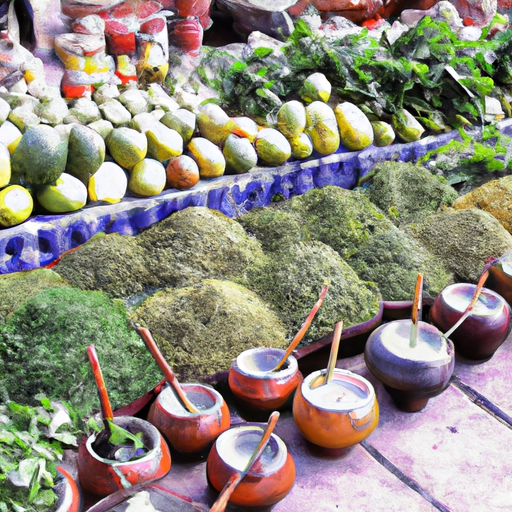While I’m leisurely enjoying a cup of yerba mate, I find myself pondering whether this cherished beverage from South America is truly beneficial for my health. Its unique earthy scent and bitter flavor have integrated seamlessly into my daily start, yet recently, there’s been an array of mixed views regarding its health advantages. Thus, the question arises, why might yerba mate be detrimental to your health?
Before we dive into the negative effects of yerba mate, let’s first understand what it is. Yerba mate is a type of tea made from the leaves of the yerba mate plant native to South America. It’s often consumed through a special straw called a bombilla and shared among friends as part of their cultural traditions.
While it’s known for providing an energy boost and aiding digestion, there are several reasons why consuming too much yerba mate may not be the best idea for our health.
Key Takeaways
- Yerba mate consumption can have benefits such as providing an energy boost and aiding digestion, but excessive consumption can lead to risks such as caffeine overdose, disrupted sleep patterns, and increased risk of bladder and esophageal cancer.
- Heat exposure while consuming yerba mate can also lead to risks such as burning of the mouth and throat, esophageal damage, and mycotoxin contamination.
- Contamination risks include pesticide residue, mold growth, and cross-contamination during transportation or packaging.
- It is important to practice moderation when consuming yerba mate or any hot beverage, and to be informed about the sourcing and potential risks associated with the product.
What is Yerba Mate?
Do you know what yerba mate is and how it affects your health? Yerba mate is a traditional South American drink that’s been consumed for centuries. It’s made by steeping the leaves of the yerba mate plant in hot water. Yerba mate production involves harvesting, drying, and grinding the leaves before they’re ready to be brewed. This process gives yerba mate its distinct flavor and aroma.
Yerba mate culture is deeply ingrained in many parts of South America, where it’s often shared among friends and family as a social ritual. Drinking yerba mate is seen as a way to connect with others while also providing energy and focus throughout the day.
In recent years, yerba mate has gained popularity outside of its native countries and can now be found in many health food stores around the world. Despite its cultural significance and popularity, some people have concerns about whether or not yerba mate is bad for you.
While there are potential risks associated with excessive consumption, there are also many nutritional benefits to consider when drinking yerba mate regularly.
The Nutritional Benefits of Yerba Mate
Sipping on this South American brew can provide a plethora of healthful perks, from boosting energy levels to improving digestion. Yerba mate is known for its high concentration of antioxidants, which help protect cells against damage caused by free radicals. This means that consuming yerba mate can potentially reduce the risk of chronic diseases such as cancer and heart disease.
In addition, yerba mate has been shown to aid in weight management. It contains compounds that can suppress appetite and increase metabolism, making it an excellent addition to any weight loss regimen. Furthermore, yerba mate has been found to improve insulin sensitivity and glucose tolerance, which may be beneficial for those with type 2 diabetes.
Overall, there are numerous nutritional benefits associated with drinking yerba mate. From reducing the risk of chronic diseases to aiding in weight management, it’s no wonder this drink has gained popularity around the world. However, it’s important to note that yerba mate does contain caffeine and other stimulants which can have negative effects if consumed in large amounts. We’ll dive into these potential downsides in the next section.
The Negative Effects of Caffeine
If you consume too much caffeine, it can have negative effects on your body and mind. While yerba mate contains less caffeine than coffee, excessive consumption of the drink can still lead to caffeine overdose. The symptoms of caffeine overdose include restlessness, nervousness, irregular heartbeat, and muscle tremors.
In addition to these symptoms, consuming too much yerba mate can also disrupt your sleep patterns. This is because the caffeine in yerba mate is a stimulant that can keep you awake and alert for several hours after consumption. If you drink yerba mate late in the day or before bed, it may be difficult for you to fall asleep or stay asleep throughout the night.
To illustrate the impact of excessive caffeine intake on sleep patterns, here’s a table:
| Time of Day | Amount Consumed | Sleep Quality |
|---|---|---|
| Morning | 1 cup of yerba mate | Good |
| Afternoon | 2 cups of yerba mate | Fairly good |
| Evening (6pm) | 3 cups of yerba mate | Poor |
| Night (9pm) | 4 cups of yerba mate | Very poor |
As seen from this table, drinking more cups of yerba mate as the day progresses affects sleep quality negatively. Therefore, it’s important to be mindful about how much we consume and when we consume it.
Next up: ‘the risk of cancer’ – research has shown that excessive consumption of hot beverages like tea and coffee may increase one’s risk for certain types of cancers.
The Risk of Cancer
Excessive consumption of hot beverages like coffee and tea has been linked to an increased risk of certain types of cancers. A study shows that drinking more than three cups a day may raise the risk of bladder cancer by up to 40%.
When it comes to yerba mate, there is evidence suggesting that it may also contain cancer-causing compounds. A study published in the Journal of Agricultural and Food Chemistry found that yerba mate contains high levels of polycyclic aromatic hydrocarbons (PAHs), which are known carcinogens. While the PAHs found in yerba mate are not unique to this beverage, their long-term effects on human health are still not fully understood.
PAHs have been linked to various forms of cancer, including lung, bladder, and skin cancer. Some studies have suggested that drinking large amounts of yerba mate over many years may increase one’s risk for these types of cancers. However, more research is needed to fully understand the link between yerba mate consumption and cancer.
In addition to its potential links to cancer-causing compounds, excessive consumption of hot beverages like yerba mate can also pose other dangers. In the next section, we will explore the dangers associated with drinking hot liquids at high temperatures.
The Dangers of High Temperature
Consuming hot beverages at high temperatures can pose potential risks to your health, including when it comes to drinking yerba mate. Heat exposure risks associated with consuming hot mate include physical side effects such as burning of the mouth and throat, esophageal damage, and an increased risk of esophageal cancer.
According to a study published in the International Journal of Cancer, drinking mate at very high temperatures (above 65°C or 149°F) was found to increase the risk of esophageal cancer by up to 90%. This is due to the chemical reactions that occur in the body when exposed to high heat for prolonged periods. Additionally, drinking hot mate can cause thermal burns on the lips and tongue.
It’s important to be cautious when consuming yerba mate or any other hot beverage. To minimize heat exposure risks, allow your drink to cool down before consuming it. Alternatively, use a straw or sip slowly to avoid burning yourself while still enjoying your favorite beverage.
As we move onto discussing potential contamination issues with yerba mate consumption, it’s important to keep these physical side effects in mind and take necessary precautions when handling hot drinks.
The Potential for Contamination
As we dive into the topic of possible contamination, it’s worth noting that not all yerba mate is created equal. Contamination risks arise from a variety of sources, including environmental impact and processing methods. While yerba mate is generally considered safe for consumption, there are potential health hazards that should be taken into consideration.
One major source of contamination arises from the use of pesticides and fertilizers on yerba mate crops. In fact, some studies have found high levels of pesticide residue in commercially available yerba mate products. Another concern is the potential for mold growth during processing and storage, which can lead to mycotoxin contamination. Additionally, cross-contamination during transportation or packaging could also occur.
To fully understand the extent of contamination risks associated with yerba mate consumption, it’s important to take a closer look at how the product is produced and processed. The following table summarizes some of the key factors that contribute to potential contamination:
| Factor | Impact |
|---|---|
| Agricultural practices | Use of pesticides and fertilizers can result in chemical residue |
| Processing methods | Mold growth during processing can lead to mycotoxin contamination |
| Transportation and packaging | Cross-contamination during shipping and handling could occur |
While these risks should not necessarily deter individuals from consuming yerba mate altogether, it’s important to be aware of them in order to make informed decisions about moderation and sourcing. As we move on to discuss moderation in consumption habits, it’s worth keeping these factors in mind when selecting a product or deciding how much to consume at any given time.
The Importance of Moderation
Maintaining a balanced intake of yerba mate is crucial for reaping its benefits without putting your health at risk. While the drink has been shown to offer several health benefits, it does contain caffeine, which can lead to negative side effects when consumed in excess. It’s important to balance consumption and practice responsible drinking habits.
Excessive consumption of yerba mate can lead to caffeine-induced insomnia, restlessness, and anxiety. This is because yerba mate contains about 30mg of caffeine per 100ml serving, making it comparable to coffee in terms of caffeine content. If you’re someone who’s sensitive to caffeine or prone to anxiety, it’s essential that you limit your intake and consume the beverage in moderation.
Balancing consumption isn’t just important for avoiding negative side effects; it also helps you get the most out of yerba mate’s properties. Drinking too much may cause diminished returns on its promised benefits such as improved cognitive function and reduced inflammation levels. To ensure that you reap all the potential health gains from drinking this tea-like beverage, make sure that you’re consuming it responsibly.
If you find yourself struggling with moderating your intake or are looking for alternative beverages with similar properties as yerba mate, there are several options available. Herbal teas like chamomile or peppermint offer relaxation benefits without containing any caffeine while green tea provides energy-boosting properties alongside antioxidants. By balancing your intake and exploring other drinks, you’ll be able to enjoy the health perks of yerba mate while keeping your well-being intact.
Alternative Beverages
If you’re looking for a tasty alternative to yerba mate, there are plenty of other beverages out there that offer similar benefits.
One option is smoothies, which can be made with a variety of fruits and vegetables that provide essential vitamins and minerals. For example, adding spinach or kale to your smoothie can boost your intake of iron and calcium, while berries like blueberries and strawberries are high in antioxidants.
Herbal teas are another great alternative to yerba mate. There are countless varieties available, each with its own unique flavor profile and health benefits. For example, chamomile tea is known for its calming properties and can help reduce anxiety and promote better sleep.
Ginger tea is also popular for its anti-inflammatory effects and ability to soothe digestive issues. When choosing an alternative beverage to yerba mate, it’s important to consider what specific health benefits you’re looking for.
Smoothie recipes and herbal teas offer a wide range of options that cater to different needs, whether you’re looking for something refreshing after a workout or something calming before bed. With so many delicious alternatives available, it’s easy to find a beverage that not only tastes great but also supports your overall well-being.
Frequently Asked Questions
How does Yerba Mate affect your sleep?
In my experience, consuming yerba mate has had a negative impact on my sleep quality. I’ve noticed that when I drink it in the evening or at night, I tend to suffer from insomnia and have difficulty falling asleep. This could be due to the fact that yerba mate contains caffeine and other stimulants that can keep the brain awake and alert.
Studies have also shown that excessive consumption of caffeine can disrupt normal sleep patterns and lead to poor quality sleep. Therefore, if you’re someone who struggles with getting a good night’s rest, it may be best to avoid drinking yerba mate in the evening or before bedtime.
Can Yerba Mate cause digestive issues?
I’ve experienced firsthand the negative effects that yerba mate can have on my digestive system. The first issue I noticed was bloating, which made me feel uncomfortable and self-conscious.
Then, I started experiencing diarrhea, which was not only unpleasant but also impacted my daily routine. After some research, I found out that yerba mate can affect gut health by disrupting the balance of good bacteria in the gut.
This can lead to issues with nutrient absorption and cause further digestive problems. While yerba mate may offer some benefits, it’s important to be aware of these potential side effects and consume it in moderation or avoid it altogether if you have a sensitive digestive system.
Is Yerba Mate safe for pregnant women?
As a pregnant woman, I’ve been concerned about the safety of consuming yerba mate.
According to evidence-based research, there are some potential risks associated with drinking yerba mate during pregnancy.
The primary concern is the caffeine content in yerba mate, which can cross the placenta and affect fetal development.
Moreover, studies suggest that excessive intake of yerba mate may increase the risk of preterm birth and low birth weight.
Therefore, it’s recommended that pregnant women avoid or limit their consumption of yerba mate to reduce any safety concerns for both mother and baby.
Does Yerba Mate have any effect on mental health?
I’ve looked into the effects of yerba mate on mental health, specifically its potential impact on anxiety.
While there isn’t a lot of research in this area, some studies have suggested that yerba mate may actually have a positive effect on anxiety levels.
One study found that participants who drank yerba mate had lower levels of stress hormones compared to those who drank a placebo.
Another study showed that drinking yerba mate improved mood and cognitive performance in healthy adults.
However, it’s worth noting that excessive caffeine intake can exacerbate anxiety symptoms for some people, and yerba mate does contain caffeine (although less than coffee).
Overall, more research is needed to fully understand the relationship between yerba mate and mental health, but initial findings suggest it may have some benefits in terms of reducing stress and improving mood.
How does Yerba Mate compare to other caffeinated beverages in terms of health effects?
When comparing yerba mate to coffee in terms of health effects, it’s important to note that both contain caffeine which can have positive and negative impacts on the body.
While coffee has been shown to improve cognitive function and reduce the risk of certain diseases like Parkinson’s and liver cancer, excessive consumption can lead to anxiety, insomnia, and digestive issues.
On the other hand, yerba mate also contains antioxidants and has been associated with weight loss, but there is limited research on its long-term effects.
In terms of overall health benefits, it may be best to consume both beverages in moderation as part of a balanced diet.
As for the claim that yerba mate aids in weight loss, more studies are needed to determine its effectiveness and potential side effects.
Conclusion
Overall, while yerba mate may have some nutritional benefits, there are several negative effects to consider. The high caffeine content can lead to jitters and anxiety, as well as disrupt sleep patterns. Additionally, studies have shown a potential link between yerba mate consumption and certain types of cancer.
It’s important to be mindful of the dangers associated with drinking yerba mate at high temperatures and the potential for contamination. Moderation is key when consuming any beverage or food item, and it’s important to weigh the pros and cons before making any dietary choices.
Consider alternatives such as herbal teas or fruit-infused water for a refreshing drink that won’t have potentially harmful side effects. In short, while yerba mate may seem like an appealing option at first glance, it’s always best to do your research before diving in headfirst.










